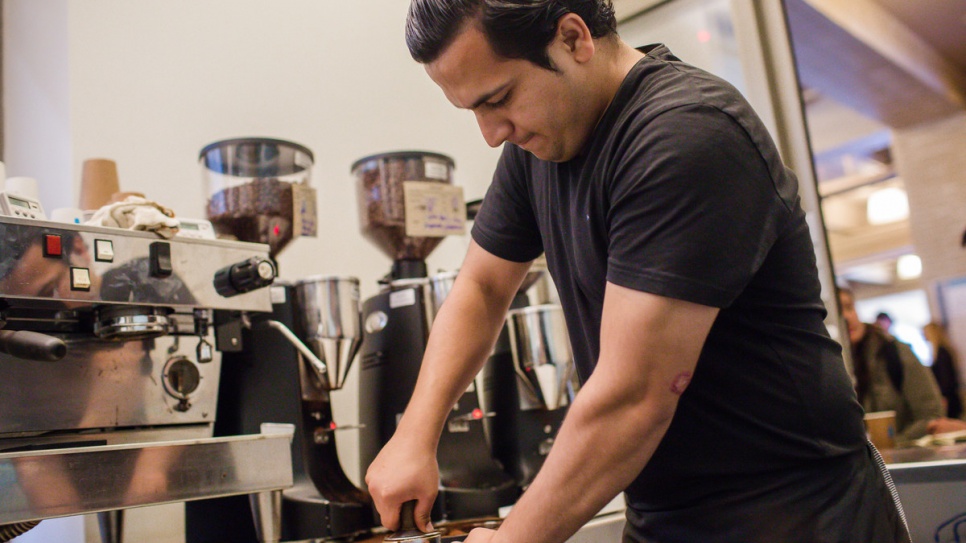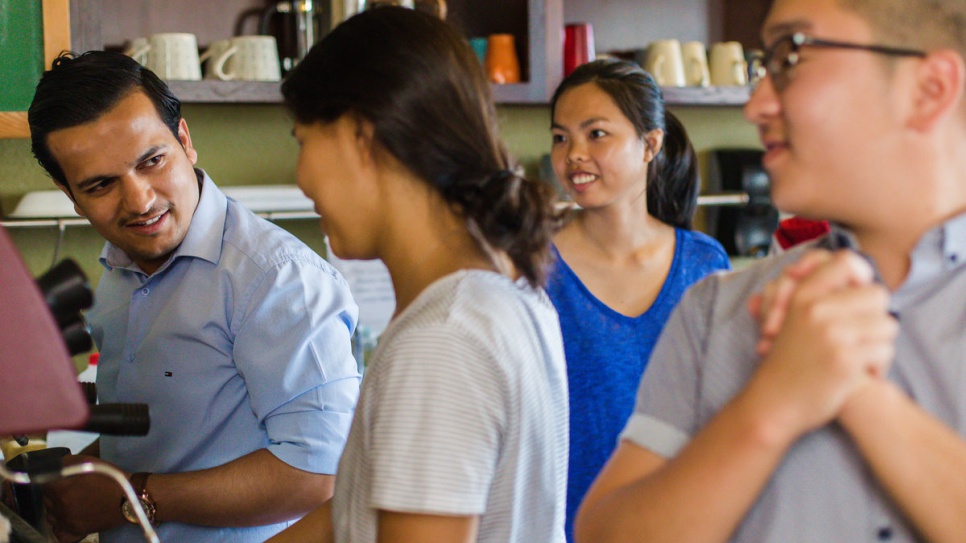California coffee project gives refugees grounds for hope
Barista scheme provides training and employment for new arrivals in the San Francisco Bay Area.

Samiullah Haidari, a refugee from Afghanistan, works his shift at the Blue Bottle Coffee Shop in San Francisco. © UNHCR/Nick Otto
Whipping up a flat white in a San Francisco coffee shop was not what Samiullah Haidari expected to be doing after he arrived in the United States as a refugee from Afghanistan.
“I want to own a business, maybe a restaurant, but I have to start somewhere and I’m learning about America’s coffee culture here,” said Haidari, 20, who started working at a San Francisco coffee shop in June after completing barista training.
The programme is run by the founders of the 1951 Coffee Company, a Berkeley-based not-for-profit. The company provides training and employment for refugees resettled to the San Francisco Bay Area.
“We want to help refugees get jobs because there are so many barriers that they face, such as culture and language, when trying to apply, interview and get noticed by an employer,” said Doug Hewitt, one of the company’s co-founders.
Hewitt and his partner, Rachel Taber, got the idea while working together at the International Rescue Committee (IRC) office in Oakland, California.

Doug Hewitt, co-founder of the 1951 Coffee Company, teaches refugees how to make different coffee drinks and become baristas. © UNHCR/Nick Otto
In the course of her work there, Taber met a young Syrian family who were trying to restart their lives. The father was highly educated, but had to settle for a job that only paid the minimum wage.
“I connected with the family and that was the moment that I thought about all of the resources I have available to me, but the family doesn’t,” said Taber, 33.
“By the time we developed the plans and signed the lease, the refugee crisis in Europe was barely starting.”
Several months later, in March 2015, a friend mentioned that the student lounge at the First Presbyterian Church of Berkeley was not being used. Taber thought the space could be used as a coffee shop. She approached Hewitt, 35, who had been a coffee roaster before working with IRC.
“By the time we developed the plans and signed the lease with the church, the refugee crisis in Europe was barely starting,” Hewitt said. “We had worked with refugees for years.”
The shop’s name pays tribute to the 1951 Refugee Convention, a legal document signed by 144 countries that defines the term “refugee” and outlines the rights of the displaced, as well as the legal obligations of states to protect them.
The coffee shop in Berkeley is set to open in September, when renovations are complete, but in the meantime Taber and Hewitt started running the training programme at the coffee bar at the Regeneration Church in Oakland. Since July 1, 19 students – from Afghanistan, Eritrea, Somalia, Viet Nam, Pakistan, Guatemala, Mongolia and Myanmar – have completed the 40-hour course.
The curriculum covers brewing coffee, making espresso-based drinks, hygiene and customer service. Taber said the standards conform to those of the Specialty Coffee Association of America, a non-profit trade organization with members in more than 40 countries.
“We drink tea in Afghanistan,” Haidari said. “Making all of these different coffee drinks was new to me.”
“We drink tea in Afghanistan. Making all of these different coffee drinks was new to me.”
Thanh Tran, a 31-year-old asylum-seeker from Viet Nam, was an interior designer in Ho Chi Minh City. “I never made a cup of coffee in Viet Nam,” she said. “Without training I wouldn’t know how to use any of these machines,” she added, pointing to a state-of-the-art espresso machine.
Just as importantly, the training programme connects graduates with employers.
“We talk with coffee shop owners and managers to recommend our graduates and let them know about their personalities, culture and potential,” Hewitt said. “It’s like a recommendation, which is hard for newly arrived refugees to get sometimes.”
Not all of the participants aspire to be baristas, but he and Taber say the training, sense of community and support they offer could help refugees and asylum-seekers build the confidence to apply for other jobs.
In June Haidari landed an interview with Blue Bottle Coffee Company in San Francisco, a high-end roaster and retailer based in California. A former classmate from his 1951 Coffee Company course went with him.
“It was my first time in the city and I was worried about finding the place, and about the interview, but she went with me,” said Haidari, who studied English and business in Kabul. His father worked as a driver for the U.S. embassy there, he said, but the family began receiving threats as a result. Haidari arrived in the Bay Area with his parents and siblings in April.
Building relationships between refugees and the communities where they live is critical to the resettlement process, Taber said. She and Hewitt designed their coffee shop to educate customers about the difficult journeys so many refugees have made to reach safety and start anew.










